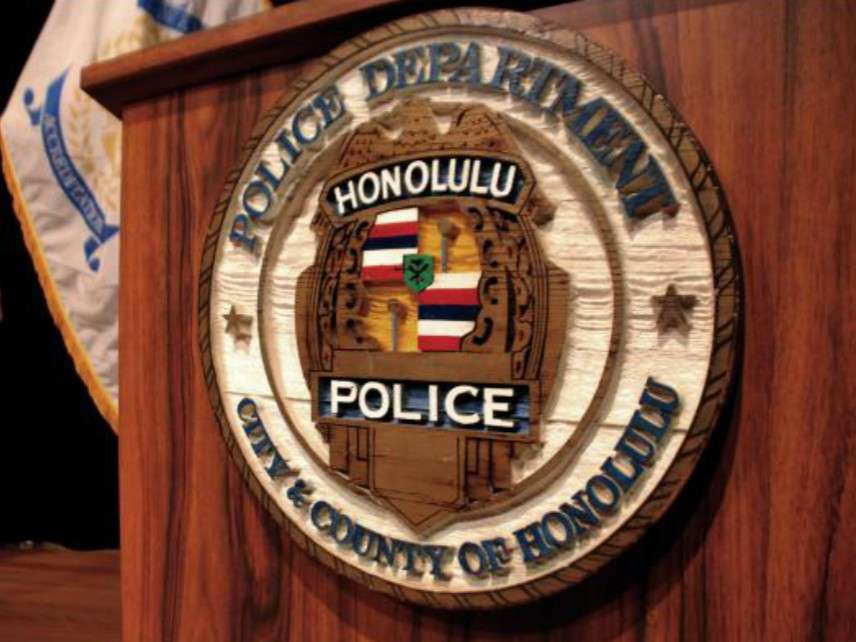Hawaii, Which Registers Guns and Medical Marijuana Users, Starts Disarming Patients
Citing state law, Honolulu's police chief tells them to turn in their guns.

Hawaii is one of 29 states that allow medical use of marijuana, but it is the only state that requires registration of all firearms. If you are familiar with the criteria that bar people from owning guns under federal law, you can probably surmise what the conjunction of these two facts means for patients who use cannabis as a medicine, which Hawaii allows them to do only if they register with the state. Some of them recently received a letter from Honolulu Police Chief Susan Ballard, instructing them to turn in their guns.
"Your medical marijuana use disqualifies you from ownership of firearms and ammunition," Ballard says in the November 13 letter, which Leafly obtained this week after Russ Belville noted it in his Marijuana Agenda podcast. "If you currently own or have any firearms, you have 30 days upon receipt of this letter to voluntarily surrender your firearms, permit, and ammunition to the Honolulu Police Department (HPD) or otherwise transfer ownership. A medical doctor's clearance letter is required for any future firearms applications or return of firearms from HPD evidence."
Although medical marijuana states typically register patients and/or issue them ID cards, Hawaii is unusual in making its registry both mandatory and accessible for purposes other than confirming eligibility, which is how Ballard knew where to send her warning. The letter, which comes just three months after Hawaii's first medical marijuana dispensary opened, does not say what will happen to gun owners who fail to "voluntarily" give up their weapons. But if police decide to pay them a visit, it should be easy enough to locate them by comparing the state's list of patients with its list of gun owners.
As authority for disarming medical marijuana users, Ballard cites Section 134-7(a) of Hawaii's Revised Statutes, which says "no person who is a fugitive from justice or is a person prohibited from possessing firearms or ammunition under federal law shall own, possess, or control any firearm or ammunition." The relevant federal provision prohibits possession of firearms by anyone who is "an unlawful user of or addicted to any controlled substance." Since federal law does not recognize any legitimate reason for consuming cannabis, all use is unlawful use, as the Bureau of Alcohol, Tobacco, Firearms, and Explosives makes clear in a boldfaced warning on the form that must be completed by anyone buying a gun from a federally licensed dealer: "The use or possession of marijuana remains unlawful under Federal law regardless of whether it has been legalized or decriminalized for medicinal or recreational purposes in the state where you reside."
Last year the U.S. Court of Appeals for the 9th Circuit, which includes Hawaii, upheld the ATF's policy of banning gun sales to people who are known to have medical marijuana cards, even if they do not currently consume cannabis. The appeals court reasoned that possessing a medical marijuana card is a good if imperfect indicator of illegal drug use, which is in turn associated with violence, "impaired mental states," and "negative interactions with law enforcement officers." The 9th Circuit concluded that there is a "reasonable fit" between the ATF's policy and a substantial government objective, which means it passes "intermediate scrutiny" and is consistent with the constitutional right to keep and bear arms.
Most people probably do not realize how casually the federal government strips Americans of their Second Amendment rights, because enforcement of these longstanding rules is spotty and haphazard. Federal law notionally bars gun ownership by all of America's 38 million or so cannabis consumers, along with millions of other unlawful users of controlled substances, including anyone who takes a medication prescribed for someone else or uses it for a purpose different from the one specified by a doctor (for back pain rather than tooth pain, say). But enforcing that ban is difficult because the FBI and the ATF generally don't know who the unlawful users are. Hawaii has begun to lick that problem and therefore can give us a sense of what "enforcing the laws that are already on the books," as the NRA frequently recommends, would look like in practice.
Update: The Honolulu Star-Advertiser reports that about 30 medical marijuana cardholders on Oahu have received warning notices from the HPD about their ineligibility to possess firearms, which it began sending in January. Since Hawaii legalized medical marijuana back in 2000, it's not clear why the HPD has suddenly taken an interest in this issue, although the recent opening of the state's first dispensary may have something to do with it. HPD spokeswoman Michelle Yu told Honolulu Civil Beat in an email that the city has been rejecting gun permit applications from medical marijuana patients for years, including 67 from 2013 to 2016. But the letters seem to be a new initiative. Yu did not respond to follow-up questions from Civil Beat. I left a message for her on Tuesday but have not received a reply.
Update II: The Star-Advertiser reports that the HPD, in response to local criticism, has stopped telling medical marijuana users to turn in their guns. The Daily Caller says police will return firearms to two patients who surrendered them. The department will continue to deny gun permits to anyone on the state's list of medical marijuana patients. "This is a new area of concern for cities across the country, and we in Honolulu want to develop a policy that's legally sound and serves our community," Ballard said in a press release. "Formulating the policy will take time, but we want to do it right."


Show Comments (67)